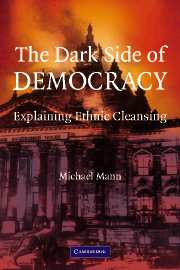Book contents
- Frontmatter
- Contents
- Preface
- 1 The Argument
- 2 Ethnic Cleansing in Former Times
- 3 Two Versions of “We, the People”
- 4 Genocidal Democracies in the New World
- 5 Armenia, I: Into the Danger Zone
- 6 Armenia, II: Genocide
- 7 Nazis, I: Radicalization
- 8 Nazis, II: Fifteen Hundred Perpetrators
- 9 Nazis, III: Genocidal Careers
- 10 Germany's Allies and Auxiliaries
- 11 Communist Cleansing: Stalin, Mao, Pol Pot
- 12 Yugoslavia, I: Into the Danger Zone
- 13 Yugoslavia, II: Murderous Cleansing
- 14 Rwanda, I: Into the Danger Zone
- 15 Rwanda, II: Genocide
- 16 Counterfactual Cases: India and Indonesia
- 17 Combating Ethnic Cleansing in the World Today
- Works Cited
- Index
3 - Two Versions of “We, the People”
Published online by Cambridge University Press: 05 June 2012
- Frontmatter
- Contents
- Preface
- 1 The Argument
- 2 Ethnic Cleansing in Former Times
- 3 Two Versions of “We, the People”
- 4 Genocidal Democracies in the New World
- 5 Armenia, I: Into the Danger Zone
- 6 Armenia, II: Genocide
- 7 Nazis, I: Radicalization
- 8 Nazis, II: Fifteen Hundred Perpetrators
- 9 Nazis, III: Genocidal Careers
- 10 Germany's Allies and Auxiliaries
- 11 Communist Cleansing: Stalin, Mao, Pol Pot
- 12 Yugoslavia, I: Into the Danger Zone
- 13 Yugoslavia, II: Murderous Cleansing
- 14 Rwanda, I: Into the Danger Zone
- 15 Rwanda, II: Genocide
- 16 Counterfactual Cases: India and Indonesia
- 17 Combating Ethnic Cleansing in the World Today
- Works Cited
- Index
Summary
THE LIBERAL VERSION
The notion that the people should rule was most famously stated thus:
We, the People of the United States, in Order to form a more perfect Union, establish Justice, insure domestic Tranquillity, provide for the common defence, promote the general Welfare, and secure the Blessings of Liberty to ourselves and our Posterity, do ordain and establish this CONSTITUTION for the United States of America.
“The people” described in the Preamble to the American Constitution now legitimates almost all modern states, and is seen unreservedly as a good and moral collectivity. Indeed, it may be the most benign form of rule humans have yet devised. But if the two meanings of “the people,” demos and ethnos, become fused, problems result – for other ethnic groups living in the same territory. The privileges of citizens may involve discrimination against ethnic out-groups. At the extreme, the out-group may be excluded, cleansed, from the territory of the people.
Yet two rather different peoples may be distinguished, a stratified and an organic people. If the people is conceived of as diverse and stratified, then the state's main role is to mediate and conciliate among competing interest groups. This will tend to compromise differences, not try to eliminate or cleanse them. The stratified people came to dominate the Northwest of Europe. Yet if the people is conceived of as organic, as one and indivisible, as ethnic, then its purity may be maintained by the suppression of deviant minorities, and this may lead to cleansing.
- Type
- Chapter
- Information
- The Dark Side of DemocracyExplaining Ethnic Cleansing, pp. 55 - 69Publisher: Cambridge University PressPrint publication year: 2004



